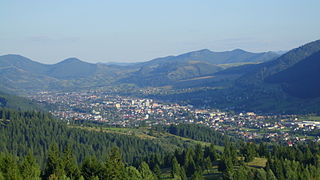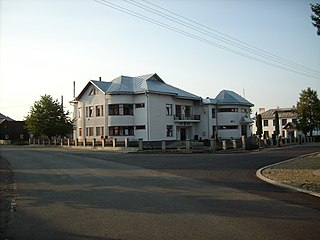
Ellis Island is a federally owned island in New York Harbor, situated within the U.S. states of New Jersey and New York, that was the busiest immigrant inspection and processing station in the United States. From 1892 to 1954, nearly 12 million immigrants arriving at the Port of New York and New Jersey were processed there under federal law. Today, it is part of the Statue of Liberty National Monument and is accessible to the public only by ferry. The north side of the island is the site of the main building, now a national museum of immigration. The south side of the island, including the Ellis Island Immigrant Hospital, is open to the public only through guided tours.

Ellis County is a county located in the U.S. state of Kansas. Its county seat and most populous city is Hays. As of the 2020 census, the county population was 28,934. The county was named for George Ellis, a first lieutenant of the Twelfth Kansas Infantry. Ellis County is the official German Capital of Kansas. German immigrants settled in Hays, Ellis, Victoria, and nearby villages in the 1870s and 1880s.

Ellis is a city in Ellis County, Kansas, United States. As of the 2020 census, the population of the city was 1,958.

Hays is a city in and the county seat of Ellis County, Kansas, United States. The largest city in northwestern Kansas, it is the economic and cultural center of the region. As of the 2020 census, the population of the city was 21,116. It is also a college town, home to Fort Hays State University.

Bukovina is a historical region, variously described as part of either Central or Eastern Europe. The region is located on the northern slopes of the central Eastern Carpathians and the adjoining plains, today divided between Romania and Ukraine.

Suceava is a municipality and the namesake county seat town of Suceava County, situated in the historical regions of Bukovina and Moldavia, northeastern Romania and at the crossroads of Central and Eastern Europe respectively. It is the largest urban settlement of Suceava County, with a population of 84,308 inhabitants according to the 2021 Romanian census.

Carpathian Germans are a group of ethnic Germans in Central and Eastern Europe. The term was coined by the historian Raimund Friederich Kaindl (1866–1930), originally generally referring to the German-speaking population of the area around the Carpathian Mountains: the Cisleithanian (Austrian) crown lands of Galicia and Bukovina, as well as the Hungarian half of the Austro-Hungarian monarchy, and the northwestern (Maramuresch) region of Romania. Since the First World War, only the Germans of Slovakia and those of Carpathian Ruthenia in Ukraine have commonly been called Carpathian Germans.

Câmpulung Moldovenesc is a city in Suceava County, northeastern Romania. It is situated in the historical region of Bukovina.

The Duchy of Bukovina was a constituent land of the Austrian Empire from 1849 and a Cisleithanian crown land of Austria-Hungary from 1867 until 1918.

Western Ukraine or West Ukraine refers to the western territories of Ukraine. There is no universally accepted definition of the territory's boundaries, but the contemporary Ukrainian administrative regions (oblasts) of Chernivtsi, Ivano-Frankivsk, Lviv, Ternopil and Zakarpattia are typically included. In addition, Volyn and Rivne Oblasts are also usually included. It is less common to include the Khmelnytskyi Oblasts in this category. It includes several historical regions such as Carpathian Ruthenia, Halychyna including Pokuttia, most of Volhynia, northern Bukovina and the Hertsa region, and Podolia. Western Ukraine is sometimes considered to include areas of eastern Volhynia, Podolia, and the small northern portion of Bessarabia.

The Bukovina Germans, also known and referred to as Buchenland Germans, or Bukovinian Germans, are a German ethnic group which settled in Bukovina, a historical region situated at the crossroads of Central and Eastern Europe, during the modern period. They are part of the larger group of Romanian Germans since the early 20th century, when they were initially living in the Kingdom of Romania.

Cârlibaba is a commune located in Suceava County, Bukovina, northeastern Romania. It is composed of six villages, namely: Cârlibaba, Cârlibaba Nouă, Iedu, Șesuri, Țibău, and Valea Stânei.

Frătăuții Vechi is a commune located in Suceava County, Bukovina, northeastern Romania. It is composed of two villages: namely Frătăuții Vechi and Măneuți.

Ilișești is a commune located in Suceava County, Bukovina, northeastern Romania. It is composed of two villages, namely Brașca and Ilișești. The commune was called Ciprian Porumbescu and included Bălăceana and Ciprian Porumbescu villages until 2004, when these were split off to form separate communes.

Armenians in Austria refers to ethnic Armenians living in Austria. They number around 6,000 and mainly live in Vienna. There is also the very important presence of the Mekhitarist Order in Vienna that plays a major role in the country as well as worldwide.

Catharine is an unincorporated community in Catherine Township, Ellis County, Kansas, United States. As of the 2020 census, the population of the community and nearby areas was 113.

Pfeifer is an unincorporated community in Freedom Township, Ellis County, Kansas, United States. It is located 10 miles (16 km) south of Victoria.

Walker is an unincorporated community in Herzog Township, Ellis County, Kansas, United States. It is located between Hays and Russell, along old Hwy 40 on the north side of I-70. Walker has a post office with ZIP code 67674.

The Bukovina Museum is a museum located in the Romanian middle-sized town of Suceava, the seat of Suceava County, named after the historical region of Bukovina which Suceava can be also perceived as a capital cultural of.

The Bukovina District, also known as the Chernivtsi District, was an administrative-territorial unit of the Kingdom of Galicia and Lodomeria within the Habsburg monarchy in Bukovina, annexed from Moldavia. It was first a military district from 1775 to 1786 until it was officially incorporated into Galicia and Lodomeria as its own district.


















